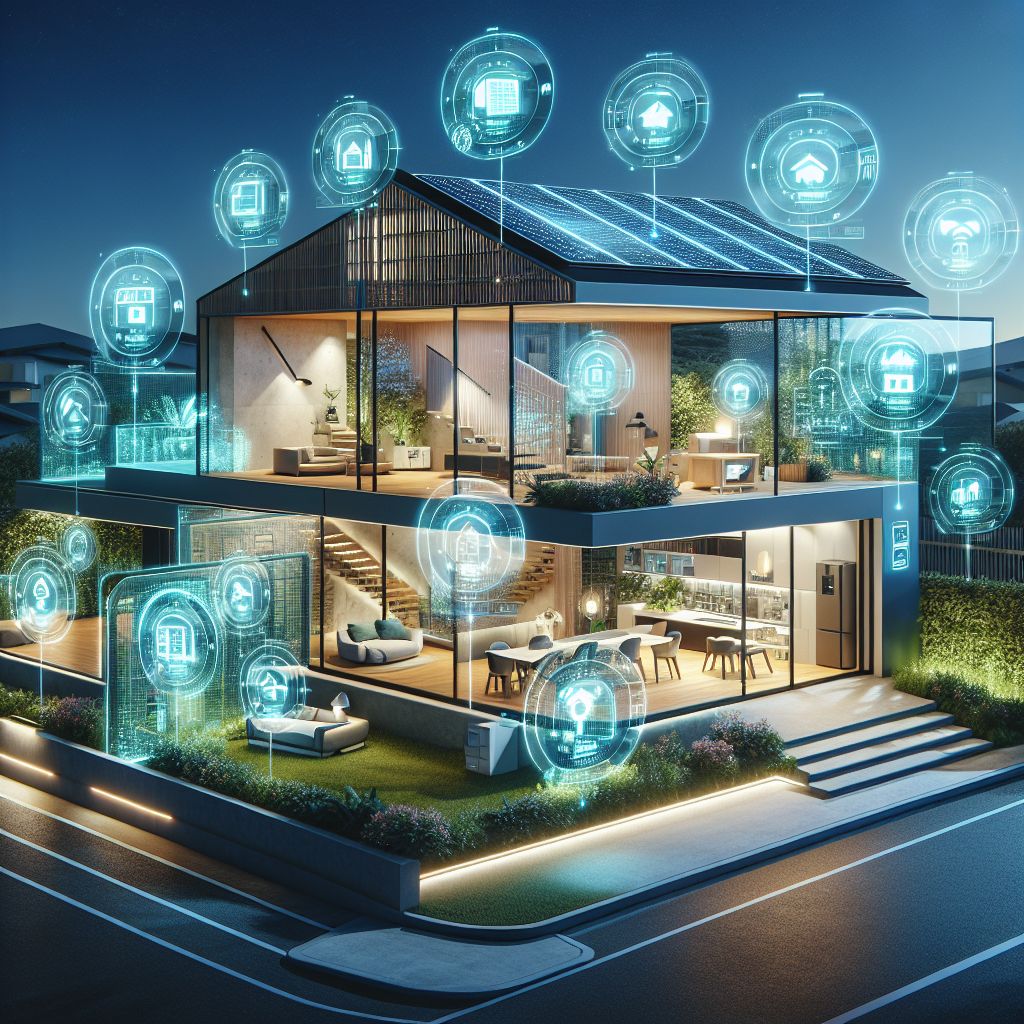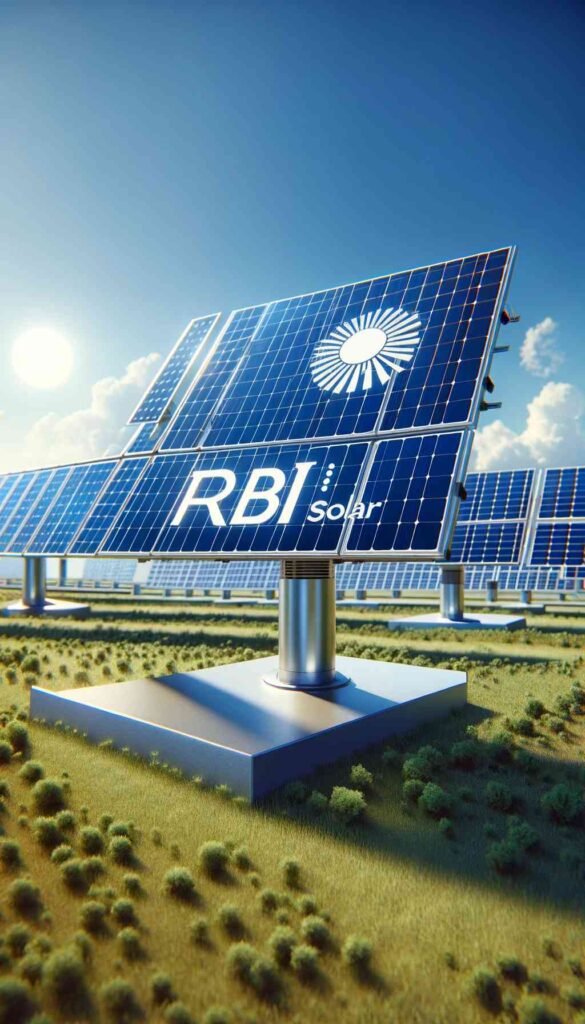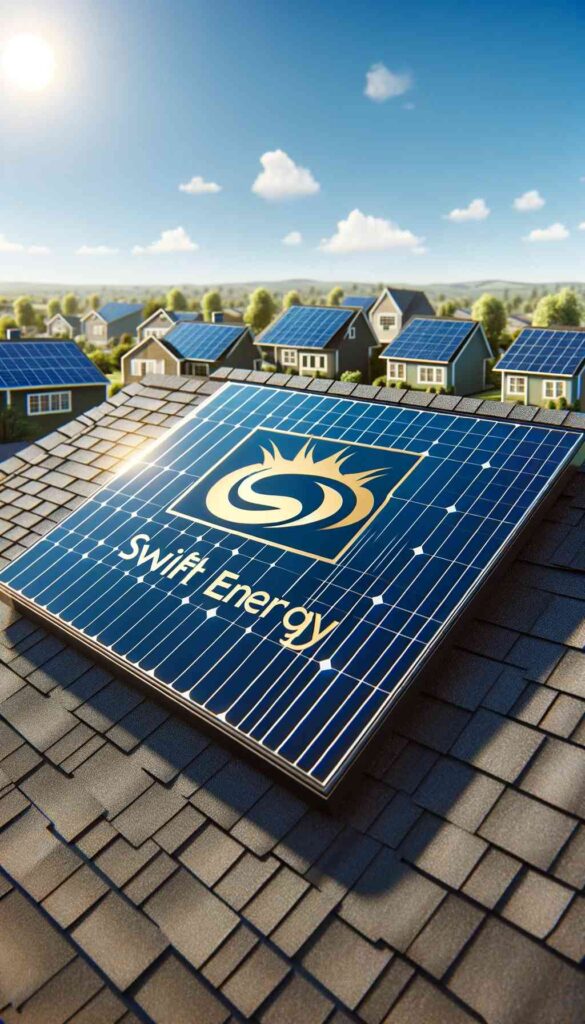Key Takeaways
- Integrating solar power with smart homes significantly boosts energy efficiency, allowing you to manage and reduce energy consumption effectively.
- Solar-powered smart homes can lead to substantial cost savings on utility bills, often reducing them by 50% or more.
- Using solar energy reduces your carbon footprint, making your home more environmentally friendly.
- Homes equipped with solar panels generally see an increase in property value, often by as much as 4%.
- Achieving energy independence with solar power means relying less on the grid and having backup power during outages.
Introduction to Solar-Powered Smart Homes
Imagine living in a home where you can control everything from the lighting to the temperature with a simple voice command or a tap on your smartphone. Now, picture that home powered by the sun, offering not just convenience, but also incredible efficiency and sustainability. This is the reality of a solar-powered smart home. By integrating solar energy with smart technology, homeowners can enjoy a seamless blend of innovation and environmental consciousness.
The Rise of Smart Home Technology
Smart home technology has been on the rise for the past decade, transforming how we interact with our living spaces. From smart thermostats that learn your schedule to security systems that provide peace of mind, these technologies offer unprecedented control and convenience. Most importantly, they have set the stage for a new wave of energy efficiency by allowing homeowners to monitor and manage their energy use in real-time.
The Role of Solar Power in Modern Homes
Solar power is not just an alternative energy source; it’s a game-changer for modern homes. By harnessing the sun’s energy, solar panels convert sunlight into electricity, which can be used to power your home. This renewable energy source is clean, abundant, and most importantly, it significantly reduces reliance on fossil fuels. When combined with smart home technology, solar power not only cuts down on utility costs but also makes homes more self-sufficient and resilient against power outages.
Benefits of Integrating Solar Power with Smart Homes
The integration of solar power with smart home systems offers a plethora of benefits that go beyond just financial savings. It transforms how energy is consumed, managed, and optimized within the household, making it a wise investment for the future.
Enhancing Energy Efficiency
One of the standout benefits of integrating solar power with smart homes is the enhancement of energy efficiency. Smart systems can monitor energy consumption patterns and make adjustments to ensure that energy is used optimally. For instance, smart thermostats can reduce heating or cooling when the home is empty, while smart lighting systems can turn off lights in unoccupied rooms. Also, using efficient inverters can further optimize the energy conversion process.
Significant Cost Savings
By utilizing solar energy, homeowners can experience significant reductions in their utility bills. Typically, solar-powered homes can reduce their electricity costs by 50% or more, depending on the size of the system and local energy prices. Over time, these savings can offset the initial investment in solar technology, making it a financially sound decision.
Environmental Benefits
Besides the financial advantages, solar power offers substantial environmental benefits. By reducing reliance on non-renewable energy sources, solar energy helps decrease carbon emissions, contributing to a cleaner and more sustainable planet. This shift towards green energy is crucial in combating climate change and protecting our environment for future generations.
Increasing Property Value
Homes equipped with solar panels often see an increase in property value. Prospective buyers recognize the long-term savings and environmental benefits, making solar-powered homes more attractive in the real estate market. Studies have shown that homes with solar installations can increase in value by up to 4%.
Achieving Energy Independence
One of the most compelling reasons to integrate solar power with smart homes is the potential for energy independence. By generating your own electricity, you become less reliant on the grid, which can be especially beneficial during power outages or in areas with unstable energy supplies. Plus, with the addition of battery storage systems, excess solar energy can be stored for use during non-sunny periods, ensuring a continuous power supply.
Key Components of a Solar-Powered Smart Home
To fully realize the benefits of a solar-powered smart home, it’s essential to understand the key components that make up these systems. Each component plays an important role in ensuring efficient energy production, management, and consumption.
Solar Panel Systems
The heart of any solar-powered home is its solar panel system. These panels are typically installed on the roof, where they can capture maximum sunlight. They convert solar energy into direct current (DC) electricity, which is then transformed into alternating current (AC) electricity by an inverter for use in the home. The size and efficiency of the solar panel system will directly impact the amount of energy generated and, consequently, the level of cost savings achieved.
Smart Inverters and Batteries
Smart inverters are a critical component of solar systems, as they convert the DC electricity generated by solar panels into AC electricity for household use. These inverters can also provide real-time data on energy production and consumption, helping homeowners make informed decisions about their energy use.
Battery storage systems are also becoming increasingly popular in solar smart homes. They store excess energy generated during sunny periods, which can be used during cloudy days or at night. This not only maximizes the use of solar energy but also provides a reliable backup power source.
Energy Management Systems
Energy management systems are the brain of a solar-powered smart home. These systems allow homeowners to track their energy usage and production, offering insights into how energy is being consumed and where efficiencies can be improved. By analyzing this data, homeowners can make informed decisions about when to use certain appliances or when to store energy for later use. This not only optimizes energy consumption but also enhances the overall efficiency of the home.
Smart Home Devices
Integrating smart home devices with solar power systems elevates the functionality and efficiency of your home. Devices like smart thermostats, lighting systems, and appliances can be programmed to operate during peak solar production hours, maximizing the use of generated energy and minimizing reliance on the grid.
For example, a smart thermostat can be set to cool the house during the afternoon when solar energy production is at its highest, thus reducing the demand on the grid. Similarly, smart lighting systems can adjust based on natural light availability, further conserving energy.
Strategies for Efficient Integration
Integrating solar power with smart home technology requires strategic planning to ensure optimal efficiency and cost-effectiveness. By implementing a few key strategies, homeowners can maximize the benefits of their solar-powered smart homes.
Optimizing Solar Energy Consumption
Optimizing solar energy consumption involves more than just installing solar panels. It’s about creating a harmonious system where solar energy is used effectively throughout the home. This can be achieved by scheduling high-energy tasks, like running the dishwasher or doing laundry, during daylight hours when solar production is at its peak.
Intelligent Automation with Smart Appliances
Smart appliances play a pivotal role in optimizing energy use. These appliances can be programmed to operate at specific times, often during periods of high solar energy production. For instance, a smart washing machine can be set to run during midday when solar panels are generating maximum electricity. This reduces the need for grid energy and lowers overall energy costs.
Real-Time Monitoring and Adjustment
Real-time monitoring is a game-changer for energy management. By using smart systems that provide real-time data on energy production and consumption, homeowners can make immediate adjustments to their energy use. This could mean turning off unnecessary lights or adjusting the thermostat based on current solar energy availability.
Maximizing Financial Benefits with Utility Programs
Many utility companies offer programs that can help homeowners maximize the financial benefits of their solar systems. These programs may include net metering, where excess solar energy is fed back into the grid in exchange for credits, or time-of-use rates, which offer lower energy costs during off-peak hours.
It’s important to research and understand the programs available in your area to ensure you’re taking full advantage of potential savings.
Challenges and Solutions in Solar Smart Home Integration
While the benefits of integrating solar power with smart home technology are significant, there are challenges to consider. Understanding these challenges and their solutions can help ensure a smooth integration process.
Initial Costs and Financing Options
The upfront cost of solar panel installation can be a barrier for many homeowners. However, there are various financing options available, such as solar loans, leases, and power purchase agreements (PPAs), which can make the initial investment more manageable.
Government incentives and tax credits can also significantly reduce the overall cost, making solar power a more accessible option for many families.
Compatibility Issues with Existing Devices
Another potential challenge is ensuring compatibility between new solar systems and existing smart home devices. It’s essential to verify that your current smart devices can integrate seamlessly with the solar technology you plan to install.
Maintenance and Upkeep Requirements
Like any technology, solar systems and smart home devices require regular maintenance to function optimally. This includes cleaning solar panels to ensure maximum efficiency and updating smart home software to keep systems running smoothly.
Regular maintenance not only extends the lifespan of your systems but also ensures they continue to provide the maximum benefits.
Local Regulations and Compliance
Before installing solar panels, it’s essential to understand local regulations and compliance requirements. Some areas may have specific zoning laws or building codes that affect solar installations. Working with a reputable solar provider can help navigate these regulations and ensure your installation is compliant.
Future Trends in Solar Smart Homes
The future of solar-powered smart homes is bright, with numerous advancements on the horizon. Emerging technologies and innovative solutions promise to make these homes even more efficient and user-friendly.
By staying informed about these trends, homeowners can continue to make the most of their solar-powered smart homes and remain at the forefront of sustainable living.
Advancements in Solar Panel Technology
Solar panel technology has come a long way, with innovations making panels more efficient and affordable than ever. Recent advancements include the development of bifacial panels, which capture sunlight from both sides, increasing energy production. The introduction of perovskite solar cells also promises to boost efficiency while reducing manufacturing costs. These technological improvements mean that homeowners can generate more energy from a smaller number of panels, making solar installations feasible even for homes with limited roof space.
Integration with Electric Vehicle Charging
As electric vehicles (EVs) become more popular, integrating EV charging with home solar systems is a natural progression. By using solar energy to charge EVs, homeowners can further reduce their carbon footprint and reliance on the grid. This integration not only provides a sustainable energy solution for transportation but also maximizes the use of solar power generated at home.
For example, you can set your EV to charge during peak solar production hours, ensuring that the energy used is renewable and cost-effective. This strategy not only saves money but also supports a more sustainable lifestyle.
The Use of AI and Machine Learning
Artificial intelligence (AI) and machine learning are revolutionizing how we manage energy in smart homes. These technologies analyze energy consumption patterns and make real-time adjustments to optimize energy use. For instance, AI can predict when energy demand will be high and adjust the operation of smart devices accordingly, ensuring that energy is used efficiently.
By integrating AI with solar systems, homeowners can enhance their energy management capabilities, leading to even greater efficiency and cost savings.
Considerations Before Implementing Solar in Your Smart Home
Before integrating solar power into your smart home, it’s important to consider several factors to ensure a successful installation and long-term benefits. Taking the time to assess your needs and options will help you make informed decisions.
Assessing Energy Needs and Goals
Start by evaluating your current energy consumption and identifying areas where you can reduce usage. Consider your future energy needs, such as plans to purchase an electric vehicle or expand your home. Understanding your energy goals will help you determine the size and type of solar system that best suits your needs.
Think also about your sustainability goals and how solar power aligns with them. This will guide your decisions and ensure that your solar installation supports your long-term vision.
Choosing the Right Solar and Smart Home Products
Selecting the right products is important for maximizing the benefits of your solar-powered smart home. Look for solar panels with high efficiency ratings and a strong warranty. Consider smart home devices that are compatible with solar energy systems and offer features that align with your lifestyle.
- Research different solar panel brands and compare efficiency, warranty, and cost.
- Choose smart home devices that can integrate with solar systems for optimal energy management.
- Consider additional components like battery storage to enhance energy independence.
By carefully selecting your products, you can create a cohesive system that meets your energy needs and supports your sustainability goals.
Professional Installation vs. DIY
Deciding between professional installation and a DIY approach is another important consideration. Professional installers have the expertise and experience to ensure that your solar system is installed correctly and efficiently. They can also help navigate permits and local regulations.
However, if you’re handy and have experience with electrical systems, a DIY installation may be a cost-effective option. Just be sure to thoroughly research the process and follow all safety guidelines.
Conclusion: Empowering Your Home with Solar Integration
Integrating solar power with smart home technology is a powerful way to enhance energy efficiency, reduce costs, and support a sustainable lifestyle. By understanding the benefits, components, and strategies for integration, homeowners can create a smart home that is not only efficient but also environmentally friendly.
As technology continues to advance, the possibilities for solar-powered smart homes will only expand, offering even greater opportunities for energy independence and sustainability. Embrace the future by integrating solar power into your smart home and enjoy the benefits of a cleaner, more efficient living environment.
Frequently Asked Questions (FAQ)
How does solar power integration enhance smart home efficiency?
Solar power integration enhances smart home efficiency by providing a renewable energy source that reduces reliance on the grid. Smart systems can monitor and adjust energy use based on solar production, ensuring that energy is used efficiently. This leads to lower utility bills and a reduced carbon footprint.
What are the key benefits of using solar energy in smart homes?
Key benefits include significant cost savings on energy bills, increased energy independence, reduced environmental impact, and enhanced property value. Solar energy also supports smart home devices, allowing for more efficient energy management and automation.
What challenges should I expect when setting up a solar-powered smart home?
Challenges may include initial costs, compatibility issues with existing devices, maintenance requirements, and navigating local regulations. However, these challenges can be mitigated with careful planning, research, and the assistance of professional installers.


